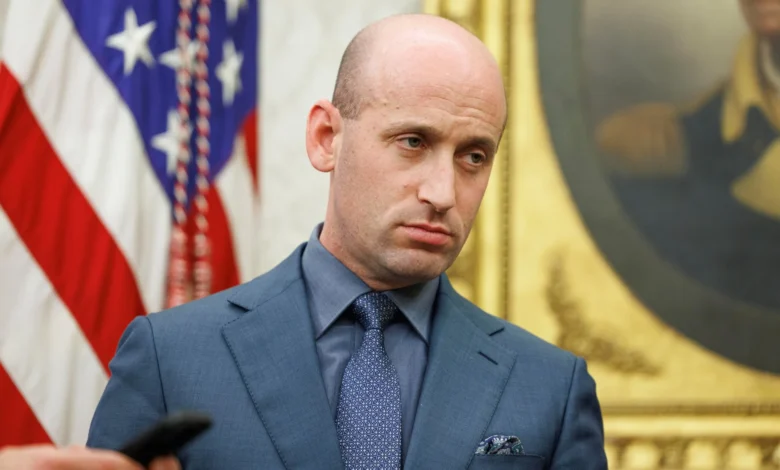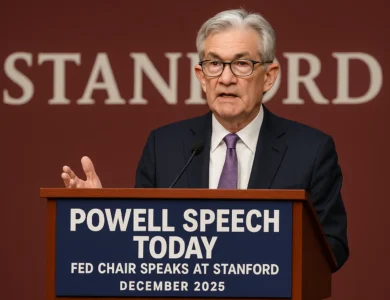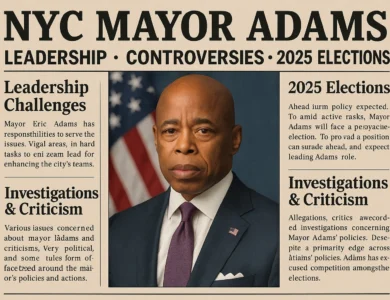
In the corridors of political power, few figures command as much influence—and controversy—as Stephen Miller. As the deputy chief of staff for policy and homeland security advisor in the current Trump administration, Miller has emerged as one of the most powerful White House officials in modern history. In November 2024, Trump named Miller as his deputy chief of staff for policy and his homeland security advisor. He is the youngest person and the first millennial to serve as homeland security advisor.
Stephen Miller’s White House role extends far beyond traditional advisory positions. The deputy White House chief of staff has emerged as a key enforcer of the D.C. operation in the month since Trump federalized the local police department. His influence permeates every major policy decision, from sweeping immigration reforms to federal government restructuring. Understanding Miller’s unprecedented authority reveals the shocking extent of his impact on American governance and the controversial nature of his political strategies.
The immigration hardliner has transformed from a congressional aide to arguably the most influential Trump advisor in the administration’s second term. Nearly every day since President Donald Trump entered office three weeks ago, he has convened a huddle in the West Wing with two of his senior-most aides to plot out the next steps dramatically reshaping the federal government. This level of access and authority represents a remarkable concentration of power that has reshaped the American political landscape in ways that continue to shock political observers and policy experts alike.
1. Miller Holds Dual High-Powered Positions Simultaneously
Unprecedented Authority Structure
Stephen Miller currently occupies two of the most influential positions in the White House: deputy chief of staff for policy and homeland security advisor. This dual role grants him extraordinary authority over both domestic and international security matters, creating a level of concentrated power rarely seen in presidential administrations.
Historical Significance of the Appointments
He is the youngest person and the first millennial to serve as homeland security advisor. This historic appointment demonstrates not only Miller’s rapid rise to power but also his generation’s growing influence in shaping national security policy. The combination of these roles allows Miller to coordinate immigration enforcement, border security, and broader homeland security initiatives with unprecedented efficiency.
Daily Operational Control
Nearly every day since President Donald Trump entered office three weeks ago, he has convened a huddle in the West Wing with two of his senior-most aides to plot out the next steps dramatically reshaping the federal government. This daily access to the president positions Miller as a key architect of federal policy, influencing decisions across multiple government agencies and departments.
2. He’s Orchestrating the Most Aggressive Immigration Crackdown in Decades
Supercharged Deportation Operations
Trump’s top immigration officials are full-steam ahead in pushing for mass deportations. Under Miller’s guidance, Immigration and Customs Enforcement (ICE) has dramatically expanded arrest operations, targeting not just undocumented immigrants but also challenging sanctuary cities and their protective policies.
Revolutionary Enforcement Strategies
Miller has implemented what critics describe as the most aggressive immigration enforcement policies in modern American history. The immigration hardliner says the president would fight to limit asylum, target “sanctuary cities,” expand the “travel ban” and cut work visas. These sweeping changes represent a fundamental shift in how America approaches immigration, affecting millions of families and communities across the nation.
Policy Implementation and Legal Challenges
The immigration policies crafted under Miller’s influence have faced significant legal scrutiny. An immigration law didn’t strip federal courts of jurisdiction over immigration cases. Courts still rule on the constitutionality of a president’s immigration actions. Despite these challenges, Miller continues to push forward with increasingly controversial enforcement measures.
3. Miller Has Become Trump’s Primary Policy Architect
Central Role in Government Restructuring
Stephen Miller’s influence extends well beyond immigration policy. As deputy chief of staff for policy, he has positioned himself as the primary architect of the administration’s broader governmental reforms, including involvement with the Department of Government Efficiency (DOGE) initiatives.
Strategic Policy Development
Miller’s policy expertise encompasses a wide range of domestic and international issues. His ability to translate Trump’s political vision into concrete policy proposals has made him indispensable to the administration’s success. This comprehensive approach to policy development has allowed Miller to influence everything from federal regulations to national security protocols.
Coordination Across Agencies
The White House role Miller occupies requires him to coordinate policy implementation across multiple federal agencies. His unique position allows him to ensure consistency in policy execution while maintaining direct communication with department heads and agency administrators.
4. He’s Leading Federal Takeover of Local Jurisdictions
Washington D.C. Police Federalization
The deputy White House chief of staff has emerged as a key enforcer of the D.C. operation in the month since Trump federalized the local police department. This unprecedented move demonstrates Miller’s willingness to use federal power to override local governance structures, setting a concerning precedent for federal-local relations.
Expansion of Federal Authority
Miller’s approach to federal enforcement represents a significant shift toward centralized control. His strategies involve bypassing traditional state and local authorities in favor of direct federal intervention, fundamentally altering the balance of power in American federalism.
Constitutional and Legal Implications
The controversial policies implemented under Miller’s guidance have raised serious constitutional questions about the limits of federal power and the rights of local communities to self-governance. Legal experts continue to debate the long-term implications of these unprecedented federal interventions.
5. Miller Authored the Original Muslim Travel Ban
Historical Policy Development
Additionally, Miller authored the executive order instituting the Muslim travel ban. This controversial policy became one of the most legally challenged and internationally criticized actions of the first Trump administration, demonstrating Miller’s willingness to pursue divisive policies despite widespread opposition.
International Relations Impact
The travel ban authored by Miller had far-reaching consequences for America’s relationships with Muslim-majority countries and international allies. The policy affected millions of individuals and created diplomatic tensions that continue to influence American foreign relations.
Legal Legacy
Miller’s authorship of such controversial legislation has established him as one of the most legally challenged policy makers in recent history. The numerous court battles surrounding his policies have created a substantial legal legacy that continues to influence immigration law and constitutional interpretation.
6. He Influenced Family Separation Policies
Controversial Enforcement Strategies
He largely influenced Trump’s immigration policy, including the practice of separating children from their families. This shocking revelation demonstrates the extent of Miller’s influence on some of the most controversial and heavily criticized immigration policies in American history.
Humanitarian Consequences
The family separation policies influenced by Miller resulted in thousands of children being separated from their parents, creating a humanitarian crisis that drew international condemnation and legal challenges. These policies revealed the human cost of Miller’s hardline approach to immigration enforcement.
Long-term Policy Impact
The controversial decisions made under Miller’s influence continue to affect immigration policy discussions and have become a defining characteristic of his approach to border security and immigration reform. The long-term consequences of these policies continue to unfold in courts and communities across America.
7. Miller Maintains Unprecedented Daily Access to Trump
Inner Circle Influence
Miller’s position in Trump’s inner circle grants him daily access to the president, allowing him to shape policy decisions in real-time. This level of access is unusual even for senior White House officials and demonstrates the trust and reliance Trump places on Miller’s policy expertise.
Strategic Communication
Press Briefing by the White House Press Secretary Karoline Leavitt and Deputy Chief of Staff Stephen Miller on Restoring Common Sense Miller’s public appearances and press briefings have become key vehicles for communicating administration policies, showcasing his role as both policy architect and public spokesperson.
Decision-Making Authority
The White House role Miller occupies allows him to make decisions that affect millions of Americans. His authority extends beyond traditional advisory functions, encompassing operational control over policy implementation and enforcement strategies.
8. He’s Reshaping Federal Government Operations
Administrative Restructuring
Miller’s influence extends to fundamental restructuring of federal government operations. His involvement with efficiency initiatives and departmental reorganization has created lasting changes in how the federal bureaucracy functions.
Personnel and Policy Integration
The Trump administration under Miller’s guidance has implemented sweeping changes to federal employment practices, immigration procedures, and inter-agency coordination. These changes represent a fundamental shift in federal governance approaches.
Long-term Institutional Impact
Miller’s policy decisions are creating institutional changes that will outlast the current administration. His approach to federal regulations and enforcement priorities is reshaping how government agencies operate and interact with the public.
9. Miller Has Survived Multiple Controversies
Political Resilience
Despite facing numerous controversies and legal challenges, Stephen Miller has maintained his position and influence within the Trump administration. After Trump’s loss in the 2020 presidential election, Miller remained with Trump. This loyalty and political survival demonstrate his strategic importance to Trump’s political operation.
Media and Public Criticism
Miller has faced intense scrutiny from media outlets, civil rights organizations, and political opponents. His ability to maintain his White House role despite sustained criticism reveals the protection and support he receives from Trump and the broader administration.
Legal Challenges and Responses
The numerous legal challenges to Miller’s policies have created a complex web of court cases and legal precedents. His responses to these challenges have shaped both his policy approach and his public reputation as a controversial but effective policy maker.
10. His Influence Extends Beyond Immigration
Comprehensive Policy Portfolio
While known primarily as an immigration hardliner, Miller’s influence extends across multiple policy areas including national security, economic policy, and federal regulations. His comprehensive approach to governance has made him one of the most powerful White House officials in the current administration.
Inter-Agency Coordination
Miller’s dual roles allow him to coordinate policy across multiple federal agencies, creating a level of policy coherence that is unusual in federal governance. This coordination capability has enhanced his effectiveness as a policy architect and implementation specialist.
Future Political Implications
The policies and precedents established under Miller’s influence will likely continue to shape American governance long after the current administration. His approach to federal power, immigration enforcement, and policy implementation has created lasting changes in how the federal government operates.
Conclusion
Stephen Miller’s White House role represents one of the most significant concentrations of political power in recent American history. As deputy chief of staff for policy and homeland security advisor, his influence spans from daily immigration enforcement operations to fundamental restructuring of federal government functions. The controversial policies and shocking decisions made under his guidance continue to reshape American governance and society.
Miller’s unprecedented authority, combined with his willingness to pursue divisive policies, has created a lasting impact on American immigration policy, federal-state relations, and constitutional governance. Whether viewed as a powerful policy architect or a controversial figure, Miller’s White House dominance represents a unique moment in American political history that will be studied and debated for years to come.
The implications of Miller’s influence extend far beyond his current tenure, creating precedents and institutional changes that will affect American governance for generations. Understanding his role provides crucial insight into the current direction of American policy and the concentration of power within the modern White House.
Read More: Why Karen Attiah’s 10 Best Columns Sparked Global Debates






